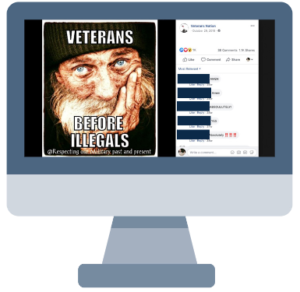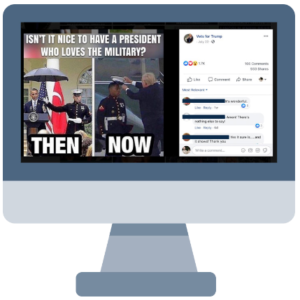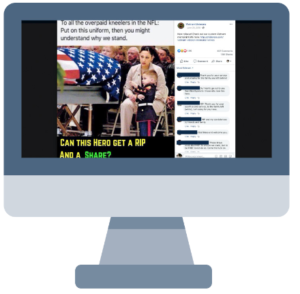Questions Raised About Whether Issue Was In Its Purview
 WASHINGTON — Veterans are regularly being targeted by social media, according to a report by the House VA Committee which recommends what VA and DoD can do to address the issue.
WASHINGTON — Veterans are regularly being targeted by social media, according to a report by the House VA Committee which recommends what VA and DoD can do to address the issue.
The report, released last month, stems from a hearing held in November 2019 where the committee heard from representatives of the major social media networks, as well as veterans service organizations, on specific instances of scamming and how they can disrupt veterans’ health and the efforts by newly-returned servicemembers to reintegrate into civilian life.
Following that hearing, House committee members had briefings from the FBI and the Justice Department and conducted further interviews with veterans, VSOs and experts on various forms of social media scamming. The ensuing report, “Hijacking Our Heroes: Exploiting Our Veterans Through Disinformation on Social Media,” details the considerable evidence of the existence of online influence campaigns originating overseas, many of which use “spoofing,” or the act of impersonating someone online to give a message credibility. Many examples of this appeared in the lead-up to the 2016 election and could be seen again in the 2020 election.
 “Veterans are more likely to be engaged in their communities, be perceived as leaders, and can exert influence on political matters, particularly with respect to defense and national security matters,” the report states. “Therefore, a successful spoofing scam that results in a veteran or veteran service organization unknowingly distributing or endorsing a piece of disinformation can yield greatly increased, and sometimes even exponential, results.”
“Veterans are more likely to be engaged in their communities, be perceived as leaders, and can exert influence on political matters, particularly with respect to defense and national security matters,” the report states. “Therefore, a successful spoofing scam that results in a veteran or veteran service organization unknowingly distributing or endorsing a piece of disinformation can yield greatly increased, and sometimes even exponential, results.”
Because veterans are more likely to move into jobs in the federal government or into civilian positions that require security clearance, some scammers try to spoof veterans in order to gain leverage over them.
The subject matter that these scam posts used to get veterans’ attention include healthcare issues. According to Graphika, a social media analysis company, these include messages about the challenges of post-traumatic stress disorder or homelessness in the veteran community.
The report makes some recommendations for how federal agencies can address the problem. These include a public service announcement campaign warning of the risk that social media content may not originate from legitimate sources, as well as a more hands-on approach at VA and DoD.
‘Cyber-Hygiene’ Training
“VA and DoD should develop robust and comprehensive cyber-hygiene training,” the report states. “This would go beyond the basic information provided by public awareness campaigns. For example, agencies could provide training on best practices in protecting personal and financial information, how to read and review content online with an eye toward verification, and how to engage the platforms themselves when needed to remove spoofed accounts, fraudulent posts, or other deceptive content.”
High-ranking Republicans on the committee felt the report goes beyond the committee’s purview, however.
“This report delves beyond this committee’s jurisdiction and expertise—expertise that exists elsewhere in Congress,” declared Rep. Phil Roe (R-TN), then-ranking Republican on the committee who has since retired. “It’s not appropriate for this committee to make recommendations to social media companies to combat spoofing.”
 “I am by no means minimizing the threat of disinformation or scams on social media that target the veterans community,” he added.
“I am by no means minimizing the threat of disinformation or scams on social media that target the veterans community,” he added.
He noted that the committee has discussed the creation of an office within VA dedicated to teaching veterans about internet safety—an effort that he would support since it’s clearly in the committee’s jurisdiction.
“If I were returning to Congress next year, I would look forward to that discussion, [but] this report misses the mark,” he said.
He also voiced concerns that the report fails to appreciate the complexities of the recommendations it includes and could unintentionally undermine free speech.
“In the past few months, we’ve seen examples of social media platforms censoring conservative voices. [The report includes recommendations to strengthen] Facebook’s fact-checking policies, which many believe lead to the censoring of conservative voices,” he declared. “More speech, not less, is how democracy thrives.”
He also noted that the Republicans in the committee were not involved in the creation of the report, which Committee Chairman Rep. Mark Takano (D-Calif) argued was by their own choice.
“Minority staff had access to the information in this report for months, and was given the opportunity to revise the report,” Takano said. “It was the minority’s decision not to participate.”
The committee voted to accept the report, through Roe said he would file a minority dissenting report.
